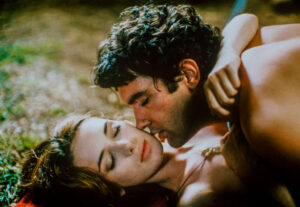The Zoomer Generation is notoriously uninterested in the risk-taking behaviours that were once a rite of passage to adulthood. They don’t drink, they don’t smoke, and they’re indifferent to sex — not just to having it, but even, according to a new study, to seeing it depicted in books or films. One wonders how these young prudes will feel about How To Have Sex.
This film about a 16-year-old Brit desperately trying to lose her virginity on a girls’ holiday to Crete strikes me, in some ways, as an heir to America’s Raunch Renaissance of the late Nineties. Back then, movies such as Sex Drive, Can’t Hardly Wait, and American Pie brought us stories of the kinds of sexual obsession that can only be harboured by teenagers who haven’t actually done it yet. As in How to Have Sex, a central theme in these films was the notion of virginity as an albatross, a shameful burden of which you needed to rid yourself at the earliest opportunity. There was one key difference, though: the embarrassed, desperate virgins in those movies were always young men.
A girl was supposed to value her virginity, only allowing herself to be coaxed into bed with promises of love and commitment; if she had sex easily, let alone eagerly, she was invariably punished by the universe, be it with pregnancy, heartbreak, or worse. Watch a slasher film from this era, and note how often the slutty high schooler is the first to die. The message from pop culture was clear: girls were not supposed to have sex. But women, on the other hand, channelling their inner Carrie Bradshaw, were supposed to not just have sex, but have sex like men.
I didn’t notice it at the time, but this seems profoundly weird to me now: that the process whereby you were supposed to go from guarding your virginity with your life as a teen to having sex constantly and casually as a young adult was rarely depicted or discussed. How was a young lady meant to advance from never done it to elite level intercourse, just by moving to the city? How were you supposed to figure out what to do, what you liked, what you and a partner enjoyed doing together? Sex education was no help here — most programmes didn’t even mention the existence of the clitoris — but even the romcom industrial complex conspired to keep us all in the dark: all you would ever see was the couple tumbling into bed at night, and then all aglow the morning after. The sexual learning curve was glossed over, completely.
And, as we see in How To Have Sex, it still is — but now it is not purity to blame, but sex positivity. Pushed upon today’s Zoomers is the notion that sex itself is meaningless, and therefore so is virginity. Once you begin to argue that having multiple partners is no big deal, it’s hard to preserve any significance around having sex for the first time: one progressive sex-ed provider in the UK invites students to think of virginity as “a damaging social construct”. For this, we may thank feminism: women, who risk the most from penetrative sex — often while enjoying it the least — probably benefit from a culture in which it is no longer seen as a special prize to be won. We may also thank the increased visibility of LGBT people, for whom equating the loss of virginity with heterosexual intercourse presents obvious problems.
And yet, the resulting landscape is one rife with profoundly mixed messages about sex. While sex positivity tells us the act is so meaningless that you should feel no compunction about doing it for the first time with a total stranger, consent culture says it’s so dangerous that you’re always a heartbeat away from being violated and traumatised for life. But more importantly, the shrinking significance of virginity as a concept has made casual sex not only an acceptable way to do it for the first time, but the expected way.
Does this reduce the stigma of being a non-virgin? No doubt. But I’m not persuaded that it’s actually helping anyone figure out, per the movie title, How to Have Sex. Whatever the shortcomings of the pre-digital era in terms of its sexual double standards, teenagers at the time at least tended to learn by doing — by building intimacy through the mutually awkward process of figuring out the alien landscape of another person’s body while they fumbled their way around yours. And alongside the Raunch Renaissance, there was another model for what first-time sex looked like, something like Buffy the Vampire Slayer: a story which, however otherwise unrealistic, still depicted sex as something people did after they were certain that they really, really liked each other.
Today’s teenagers don’t even have that. They have porn — and hook-up culture, which means your first sexual experience could be with a partner who doesn’t love you, or barely know you. And the weirdest part is, this is supposed to be fun, a paradox that How To Have Sex highlights exceptionally well. The immense uncertainty surrounding a young woman’s sexual debut is painstakingly, and painfully, shown here, and the pressure to be unburdened of the albatross of virginity is only one piece of it. Another is the expectation — for everyone, not just women — that one must be not only as skilled between the sheets as a porn star but also as emotionally detached. In some senses, the Nineties model has been fully flipped: physical intimacy is now par for the course, while emotional intimacy is coded as cringe. That a person could view sex as the physical act of love, which is ironically the one thing that would actually make the whole process less fraught and more fun, is barely nodded at. Tara may not know how to have sex, but she knows enough to know that having feelings for the person you’re doing it with is super embarrassing.
Perhaps needless to say, this does not end well — for the characters in the movie, and often for young women in real life. I want to say that Tara has a uniquely bad experience on this front, but what really strikes me is how not-unique it must be, how common. The whole scene, these dark and pulsing landscapes full of beautiful young people dancing, drinking, sweating, screaming: it makes for great cinema, but how are you supposed to connect with anyone under these circumstances? Even the friendship Tara strikes up with another girl, after getting separated from her friends at a club, is like the platonic equivalent of a one-night stand: the emptiness of the connection stands in stark contrast to her relationships with her friends, even the bad friend who keeps trying to embarrass and undermine her. There’s a moment in the film where one of the girls notes that they need to be more social. “We’re never getting laid if we only hang out with each other,” she says. It’s true, but also: when you see what getting laid entails, hanging out with the girls and eating cheesy chips is clearly the better option.
That is, unless you’re a virgin so desperate to shed the mantle of sexual inexperience that you don’t even care anymore how it happens or with whom. Tara is on a mission — though it’s unclear if it’s a mission she volunteered for or one her friends have assigned to her — and there’s a giddy energy to her early exploits in Crete that’s not unlike the American Pies and Can’t Hardly Waits of the world. For the first half of the movie, her virginity is a burden, yes, but also a source of excitement, anticipation. Every time a boy touches her, you can see the wheels in her head turning: is this how it will happen? Or this? Or this?
And then it does happen. What’s possible becomes what’s inevitable, and what’s left is all the uncertainty, and none of the sparkle. And while it’s understood that Tara’s choice of partner has something to do with this, that things would have played out differently if she’d held out for a better and more respectful guy, it’s hard to say how differently, when even the best-case scenario is still a one-night stand with a virtual stranger.
This seems to be the biggest problem with the discourse around virginity, which focuses on sex as the end of something — one’s embarrassing virginal status — as opposed to the beginning that it is. Becoming sexually active is like learning to drive: the first time you do may feel significant in the moment, but it’s not going to be your best time, or your most memorable. Tara, like any teenager, would benefit from looking beyond the milestone and asking herself what comes after: once sex stops being about losing your virginity, what is it actually for? And absent the desire to be rid of her V-card, what does she actually want?
In the end, Tara has had sex. But she still doesn’t really know how to.
Disclaimer
Some of the posts we share are controversial and we do not necessarily agree with them in the whole extend. Sometimes we agree with the content or part of it but we do not agree with the narration or language. Nevertheless we find them somehow interesting, valuable and/or informative or we share them, because we strongly believe in freedom of speech, free press and journalism. We strongly encourage you to have a critical approach to all the content, do your own research and analysis to build your own opinion.
We would be glad to have your feedback.
Source: UnHerd Read the original article here: https://unherd.com/



